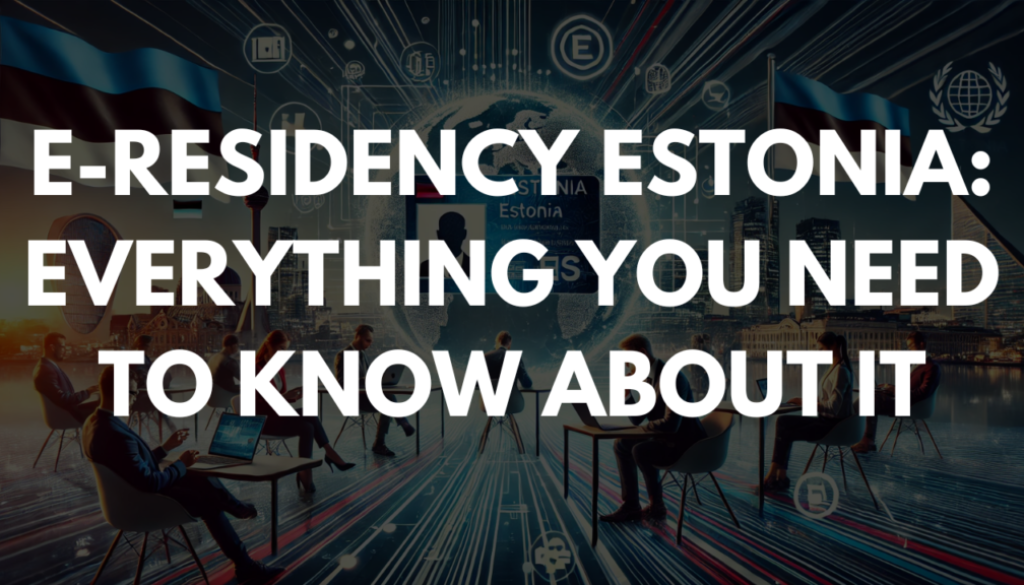E-Residency Estonia: Everything You Need To Know About It
Estonia country, a small Baltic nation in northeastern Europe, has positioned itself as a global leader in digital innovation with its e-Residency program.
Known for its rich historical context and significant events that have shaped its national identity, Estonia is a member of both NATO and the European Union. This unique initiative offers a gateway for entrepreneurs worldwide to establish and manage businesses in the European Union without physically being in Estonia.
In a recent conversation between Kadri who is the co-founder of Silva Hunt and Victoria Silber from b2bexportservices, we explored the benefits, application process, and practical insights into leveraging Estonian e-Residency for business growth.
What is an Estonian e-Residency?
Estonian e-Residency is a groundbreaking initiative by the Estonian government, offering a government-issued digital identity that provides access to Estonia’s advanced digital business environment.
This innovative program, launched by the Republic of Estonia, enables non-Estonians to start and run an EU-based company entirely online. The e-Residency program grants access to a range of services typically available to Estonian citizens, such as signing documents digitally, accessing banking services, and filing taxes online, making it a prime example of Estonia’s commitment to minimal bureaucracy and digital governance.
Historical Context and Soviet Occupation
Estonia, a parliamentary republic located in northeastern Europe, has a rich history marked by Soviet occupation and subsequent independence.
Estonia remained a Soviet republic until 1991, when it was the first to declare independence from Soviet Russia, re-establishing its status as the Republic of Estonia. Estonia joined the European Union in 2004, further solidifying its place among European countries.
The Estonian government has since embraced digital innovation, making significant strides in e-governance and digital citizenship, highlighted by the introduction of the e-Residency program.
Benefits of Estonian e-Residency
Ease of Business Setup:
Establishing a company in Estonia is straightforward, supported by a robust digital infrastructure.
Services such as those offered by Silva Hunt assist foreigners in setting up companies, providing legal and tax advice, and managing accounting. This ease of setup makes Estonia an attractive destination for global entrepreneurs.
Access to the EU Market:
For non-EU businesses, e-Residency offers a hassle-free way to enter and operate within the European market.
The program simplifies the process of accessing the EU market, allowing businesses to bypass extensive paperwork and regulations typically associated with non-EU entities. This access is particularly beneficial for businesses aiming to reach the broader European market.
Reduced Bureaucracy:
Estonia is renowned for its efficient and transparent bureaucracy.
Many EU clients use e-Residency to escape the high levels of bureaucracy in their home countries, such as Spain and Germany. The Estonian government’s commitment to reducing administrative burdens makes it an ideal choice for business owners seeking a more streamlined operational environment.
Reputation:
Estonian companies are well-regarded globally, offering trust and credibility in international dealings.
The transparency and efficiency of Estonia’s systems are recognized by countries like Germany and France, enhancing the reputation of businesses operating under the Estonian e-Residency program.
Who Can Benefit from Estonian e-Residency?
Digital Nomads:
Individuals who work remotely and travel frequently find e-Residency a stable business base.
It provides the flexibility needed for digital nomads to manage their businesses from anywhere in the world.
Non-EU Entrepreneurs:
Those looking to enter the EU market without dealing with extensive red tape can benefit significantly from the e-Residency program.
It offers a straightforward path to accessing the European market.
EU Entrepreneurs:
Business owners from EU countries with cumbersome bureaucratic systems, such as those in Spain and Germany, can use e-Residency to avoid the heavy administrative burdens of their home countries.
Startups and Innovators:
Companies looking to test and launch new products within a tech-friendly environment will find Estonia’s e-Residency program advantageous.
The country’s support for innovation and technology makes it an ideal location for startups and innovators.
The Estonian e-Residency program exemplifies Estonia’s commitment to digital innovation and minimal bureaucracy.
By offering a seamless way to establish and operate a business within the EU, it opens up numerous opportunities for entrepreneurs worldwide. Whether you are a digital nomad, a non-EU entrepreneur, an EU business owner seeking to escape heavy bureaucracy, or a startup looking to innovate, Estonian e-Residency provides the tools and environment to thrive.

Application Process
Initial Application
Applicants fill out a form on the official e-Residency website, providing personal and business information.
Kadri mentions that this takes about 15-20 minutes and includes questions about the applicant’s background and reasons for applying. This digital identity is a pioneering initiative by the Estonian government, reflecting the country’s forward-thinking approach to global business.
Approval and Card Issuance
The approval process typically takes around 10 days. Upon approval, the e-Residency card is sent to the nearest Estonian embassy or consulate.
Kadri states that the full process from application to receiving the card takes about one month. This program is part of Estonia’s broader strategy to attract global entrepreneurs and foster international business relationships.
Company Formation
With the e-Residency card, setting up a company online can take less than a week. Silva Hunt assists clients with this process, ensuring that legal and tax advice is provided and necessary documentation is prepared.
Estonia, the first country to offer e-Residency, has created a minimal bureaucracy environment conducive to business operations.
Bank Account Setup
Depending on the type of account, this can be done online through fintech companies like Wise or Revolut, or through traditional banks if there are established connections with Estonia.
Kadri emphasizes that traditional banks may require a physical presence or business activity in Estonia, whereas fintech solutions offer more flexibility. This aspect of the e-Residency program highlights Estonia’s integration with the broader European Union financial ecosystem.
Common Misconceptions and Limitations
Not a Visa
E-Residency does not grant the right to live or travel to Estonia or the EU. It is purely a digital identity for accessing e-services.
This clarification is crucial for potential applicants to understand the scope of the program.
Not a Tax Residency
It does not automatically provide tax residency in Estonia. Kadri clarifies that e-Residency is connected to the person, not the business, and does not confer tax residency or visa benefits.
Understanding the distinction between digital identity and physical residency is essential for applicants.
Banking Challenges
While fintech solutions are readily available, opening an account with a traditional bank may require a physical presence or established business activities in Estonia.
Kadri explains that connections with Estonia, such as having an office, employees, or partners, are necessary for traditional banks to consider opening an account. This underscores the importance of establishing substantial ties with the Estonian business environment.
Taxation and Legal Considerations
Estonian corporate tax is unique in that profits are only taxed when distributed.
Estonia’s current tax system evolved significantly after the country gained independence following the Singing Revolution, transitioning from the constraints of Soviet rule. Kadri highlights the simplicity of the Estonian tax system, where income is not taxed annually but only when profits are distributed.
This encourages reinvestment in the business, a strategy that aligns with Estonia’s market economy principles.
Estonian Business Culture and Practices
Estonia boasts a transparent and efficient business culture influenced by its historical ties with Germany.
East Estonia, adjacent to Russia, is notable for its rich biodiversity, including rare species like the Siberian flying squirrel, and the concentration of the oil shale-based mining industry. Estonians are known for their punctuality, direct communication, and digital proficiency, making it a favorable environment for business operations. Kadri emphasizes that Estonians are very direct and transparent, which can sometimes be perceived as blunt by other cultures.
Additionally, the historical significance of northern Estonia, particularly its role during the Danish conquest and the Crusades, has also played a part in shaping the business culture.
Support and Community for e-Residents
Government Support
The e-Residency office organizes events and provides resources to help e-residents integrate and succeed.
These events offer opportunities for networking, learning, and collaboration, helping e-residents connect with the broader business community. Estonia’s commitment to supporting e-residents reflects its innovative approach to leveraging digital signatures and e-residency programs.
NGO Support
Organizations like Erica offer networking opportunities and support for e-residents.
These groups provide valuable resources and guidance, helping e-residents navigate the challenges of establishing and growing their businesses. This support network is vital for e-residents to gain access to necessary tools and knowledge.
Service Providers
Companies like Silva Hunt offer comprehensive services, from company formation to ongoing tax and legal support.
These service providers play a crucial role in helping e-residents manage their business operations and comply with local regulations. Their expertise ensures that e-residents can focus on their core business activities.
Future of e-Residency
The Estonian government continues to enhance the e-Residency program by reducing processing times, expanding service offerings, and increasing global pickup locations for e-Residency cards.
There are also plans to eliminate the physical card requirement, further simplifying the process. Kadri mentions that the government is working on making the process faster and more accessible, including the potential for cardless solutions.
Estonian e-Residency is a revolutionary program that democratizes access to the EU market, offering unparalleled convenience and efficiency for global entrepreneurs.
By leveraging Estonia’s advanced digital infrastructure, e-residents can seamlessly manage their businesses from anywhere in the world. The significance of independent Estonia in fostering digital innovation and global entrepreneurship cannot be overstated. For more information or to start your e-Residency journey, visit the official e-Residency website or contact a certified service provider like Silva Hunt.
This article captures the essence of the Estonian e-Residency program, providing a comprehensive guide for prospective e-residents.
For further inquiries or assistance, Kadri and the team at Silva Hunt are ready to help you navigate this innovative business landscape.

Additional Resources and Support
For those interested in learning more about e-Residency or seeking assistance with their application, a range of resources and support services are available.
These include:
Official e-Residency Website:
The primary source of information and guidance on the e-Residency program.
The website offers detailed instructions on the application process, FAQs, and contact information for support services.
Community Forums:
Online forums and discussion groups where e-residents can share experiences, ask questions, and connect with peers.
These platforms provide valuable insights and support from a global community of e-residents.
Webinars and Workshops:
Regularly scheduled webinars and workshops organized by the e-Residency office and partner organizations.
These events cover a wide range of topics, from application tips to business development strategies, and offer opportunities for interactive learning and networking.
Local Partners:
Certified service providers and local partners who offer specialized services and support for e-residents.
These partners can assist with company formation, accounting, legal compliance, and other essential business needs.
Case Studies and Success Stories
To illustrate the impact of e-Residency, it is helpful to look at real-life examples of individuals and businesses that have benefited from the program.
Here are a few case studies:
Digital Nomad Entrepreneurs: Many digital nomads have leveraged e-Residency to establish and manage successful online businesses.
These entrepreneurs often work in fields such as software development, digital marketing, and content creation, taking advantage of Estonia’s digital infrastructure to operate seamlessly from anywhere in the world.
Tech Startups: Several tech startups have used e-Residency to launch innovative products and services.
By establishing a business in Estonia, these startups gain access to a supportive ecosystem, funding opportunities, and a receptive market for testing new ideas.
International Trade: E-Residency has facilitated international trade for businesses looking to enter the EU market.
Companies from countries such as India, South Korea, and Mexico have used the program to set up operations in Estonia, benefiting from the country’s favorable business environment and strategic location. These case studies highlight the diverse ways in which e-Residency can support business growth and success.
They also demonstrate the program’s potential to drive economic development and innovation on a global scale.

Conclusion
Estonian e-Residency is more than just a digital identity; it’s your gateway to global business opportunities.
By offering a secure and efficient way to establish and manage a business in the European Union, e-Residency empowers entrepreneurs from around the world to reach new markets, reduce bureaucracy, and operate with greater flexibility. Whether you’re a digital nomad, a startup founder, or an established business owner looking to expand internationally, e-Residency provides the tools and support you need to succeed. Estonia, an independent republic in northeastern Europe, has transformed from its Soviet Union past to become a leader in digital innovation.
From declaring independence from Soviet Russia in 1918, enduring the invasion during the Estonian War of Independence, to signing the Tartu Peace Treaty, Estonia’s journey to its current status as a digital leader is remarkable.
The Estonian government developed the e-Residency program to help global entrepreneurs gain access to the EU market, enabling them to sign documents with digital signatures and become tax residents without physical presence. Estonia’s journey from Soviet occupation to a thriving market economy highlights its resilience and forward-thinking approach.
For more information or to begin your e-Residency journey, visit the official e-Residency website, explore the available resources, and connect with certified service providers like Silva Hunt.
Together, we can unlock the full potential of Estonia’s digital society and create a brighter future for global entrepreneurship. Estonia, the first country to offer such a program, remains a beacon for minimal bureaucracy and efficient business operations. The e-Residency program is especially beneficial for entrepreneurs from Eastern Europe, South Korea, and other countries looking to establish a foothold in the European market.
Estonian citizens and ethnic minorities alike have benefited from the country’s innovative digital infrastructure.
As Estonia joined the EU, its commitment to providing a seamless business environment has only strengthened. The unicameral parliament and prime minister of Estonia continue to support initiatives that foster economic growth and digital advancement. From the northern coast to Lake Peipus, and from the Narva power plants to the bustling construction industry in Tallinn, Estonia’s digital transformation touches every corner of the country.
The Republic of Estonia offers a unique blend of historical heritage and modern technology, making it an ideal destination for entrepreneurs and businesses worldwide.
Q&A Conversation between Kadri from Silva Hunt and Victoria Silber from B2B Export Services
Q: Which countries benefit most from e-residency?
A: Estonia’s system benefits those looking to avoid bureaucracy, like Spain and Germany.
It provides a transparent and trustworthy system, allowing companies to gain access to European bank accounts and manage risks.
Q: What is the process of applying for e-residency?
A: Applicants fill out an online form on the e-residency website, taking about 15-20 minutes. It takes around 10 days to get a reply and a month to receive the card at the nearest Estonian embassy.
Company incorporation follows quickly, typically within a week.
Q: Can everything be done online?
A: Yes, everything except picking up the card from the nearest embassy can be done online.
Bank accounts can also be opened online, depending on the type.
Q: Are there restrictions and denials for e-residency?
A: Criminal records and being from blacklisted countries can restrict obtaining e-residency.
The program is person-specific, not business-specific.
Q: What does the e-residency card look like and what are its functions?
A: The card looks like an Estonian identity card but is specific to e-residents.
It provides a personal code for accessing local systems but does not grant residency, tax residency, or visa benefits.
Q: How does banking work for e-residents?
A: Banks require connections to Estonia, like an office or employees, to open accounts.
For those without local connections, fintech solutions like Wise are recommended.
Q: Can you describe the Estonian business culture?
A: Estonia’s business culture is transparent and punctual, influenced by German culture.
Estonians are known for being direct, which can sometimes be surprising to other nationalities.
Q: Are there networking opportunities for e-residents?
A: The e-residency office organizes community events, and there is an NGO called EERICA for e-residents.
Silver Hunt also holds biannual events for clients to network and build partnerships.
Q: What is the future of e-residency?
A: The government aims to shorten the application process and make the system cardless.
More identification locations and connections to the Estonian ecosystem are planned.
Q: What is the digital infrastructure like in Estonia?
A: Estonia has digitized almost everything, providing user-friendly services.
The tax office is notably welcoming, and many services are pre-filled for ease of use.
Q: How do tax reporting and obligations work?
A: Hiring a service provider simplifies tax reporting.
The VAT rate is 22%, and income is taxed only when taken out of the company. Various options for extracting income include board member fees, salaries, and dividends.
Q: What are common mistakes new e-residents should avoid?
A: Misunderstandings about tax residency and visa benefits are common.
Consulting certified service providers and avoiding random online information is advised.
Q: Who are the ideal candidates for e-residency and who might not find it beneficial?
A: Digital nomads and those wanting to benefit from Estonia’s ecosystem, like startups and test beds, find e-residency beneficial.
Those focused only on local markets in their home country might not benefit.




